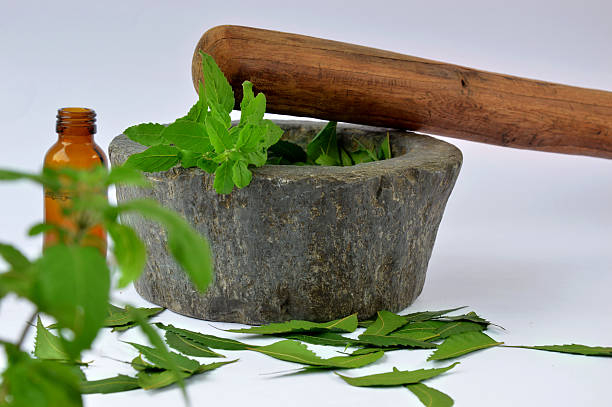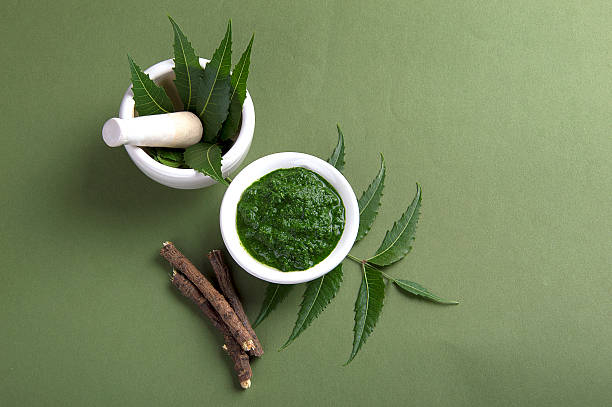Top 5 Health Benefits of Neem
In the field of Ayurveda, neem is a well-known medicinal plant that has been used in traditional medicines for about 5000 years. The neem tree, also known as ... read more...Azadirachta Indica in English or 'Neemba' in Sanskrit, is a great illustration of how nature bears both the problem and the remedy. Because neem leaves have anti-bacterial characteristics, they can help with infections, burns, and other skin issues. This tree's many components have long been used in traditional Asian medicine. Here are the best health benefits of neem.
-
Neem leaves contain powerful antioxidants such as quercetin and nimbolide, which help protect against free radical damage. Free radicals are known to cause DNA damage and have been linked to diseases such as diabetes, heart disease, and cancer. They also contribute to the lower aging process. Neem-based vitamins and therapies may assist you in combating free radicals.
Diabetes affects around 30.3 million Americans, according to estimates. Even more concerning, it is estimated that 84.1 million American adults have prediabetes. Neem has the potential to heal what is quickly becoming a global disease. Animal research found that neem leaf extract and neem seed oil might reduce blood sugar levels. In fact, their impact was equivalent to that of glibenclamide, an anti-diabetic medication. The study also discovered that giving the mice the leaf extract or seed oil for two weeks before starting them on a drug that developed diabetes helped reduce blood sugar spikes.

Contain Anti-Aging and Lower Blood Sugar 
Contain Anti-Aging and Lower Blood Sugar -
Azadirachtin, an active chemical found in neem seed extract, may help combat parasites that damage the hair and skin, such as lice. Azadirachtin works by interfering with parasite growth, reproduction, and other cellular processes. In research that looked at the effectiveness of a neem-based shampoo on head lice in youngsters, keeping the shampoo in their hair for 10 minutes killed the lice while being gentle on the skin.
Because of its anti-inflammatory and antibacterial qualities, neem extract and nimbidin, a molecule present in neem oil, may also be used to treat dandruff. Fungal growth on the scalp can cause dandruff and scalp discomfort.

May promote hair health 
May promote hair health -
In India, chewing neem bark to increase oral cleanliness is a popular habit. The antibacterial, anti-inflammatory, antioxidant, and immune-boosting properties of neem may benefit dental health. Although further study is needed, studies show that neem may alleviate discomfort and aid in the treatment of gingivitis, periodontitis, and tooth decay.
Furthermore, research suggests that neem may reduce bacteria's capacity to colonize the surface of your teeth, hence lowering plaque production. Furthermore, in a 21-day trial of 45 persons with gingivitis, neem mouthwash was found to be just as good at decreasing gum bleeding and plaque as chlorhexidine mouthwash – a heavy-duty prescription mouthwash.

May boost dental and oral health 
May boost dental and oral health -
Neem's antioxidant and anti-inflammatory qualities may aid in the battle against oxidative stress, promoting liver and kidney function. Oxidative stress is generated by an accumulation of unstable chemicals known as free radicals. Although free radicals are produced naturally by your body as a result of metabolism, external sources enhance their abundance.
Some medications, such as cancer treatment, pain relievers, and antipsychotics, may contribute to oxidative stress, resulting in tissue damage in your liver and kidneys. Surprisingly, one rat research discovered that neem leaf extract decreased liver damage caused by high-dose acetaminophen. Another rat study found similar results, indicating that neem extract reduced the damage to kidney tissue induced by chemotherapy drugs.

May aid liver and kidney health 
May aid liver and kidney health -
The neem seed oil contains a high concentration of fatty acids, including oleic, stearic, palmitic, and linoleic acids. These fatty acids, when combined, offer anti-inflammatory, antioxidant, and antibacterial effects that support healthy skin. While Ayurvedic medicine – an Indian traditional healing system — employs neem to treat psoriasis and eczema, relatively little scientific research back up these claims.
Neem has traditionally been used to cure acne, decrease blemishes, and increase skin suppleness. Indeed, research shows that the antimicrobial characteristics of neem oil help to treat acne. Test-tube research found that adding neem oil to solid lipid nanoparticles (SLNs), a novel type of medicine formulation that provides a steady release of active components, may help with long-term acne therapy.

May improve skin health 
May improve skin health


























